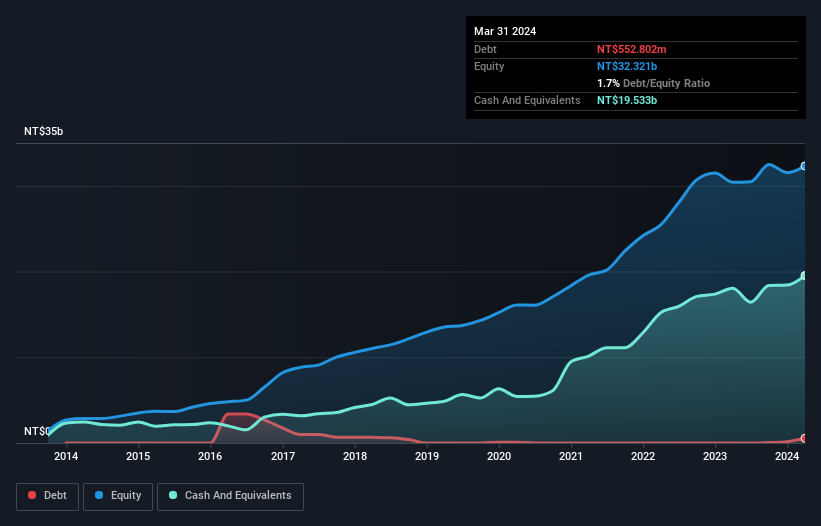Legendary fund manager Li Lu (who Charlie Munger backed) once said, 'The biggest investment risk is not the volatility of prices, but whether you will suffer a permanent loss of capital.' So it might be obvious that you need to consider debt, when you think about how risky any given stock is, because too much debt can sink a company. As with many other companies Silergy Corp. (TWSE:6415) makes use of debt. But is this debt a concern to shareholders?
When Is Debt A Problem?
Debt assists a business until the business has trouble paying it off, either with new capital or with free cash flow. Ultimately, if the company can't fulfill its legal obligations to repay debt, shareholders could walk away with nothing. However, a more frequent (but still costly) occurrence is where a company must issue shares at bargain-basement prices, permanently diluting shareholders, just to shore up its balance sheet. Of course, plenty of companies use debt to fund growth, without any negative consequences. When we think about a company's use of debt, we first look at cash and debt together.
View our latest analysis for Silergy
How Much Debt Does Silergy Carry?
The image below, which you can click on for greater detail, shows that at March 2024 Silergy had debt of NT$552.8m, up from none in one year. However, its balance sheet shows it holds NT$19.5b in cash, so it actually has NT$19.0b net cash.

A Look At Silergy's Liabilities
We can see from the most recent balance sheet that Silergy had liabilities of NT$3.01b falling due within a year, and liabilities of NT$961.5m due beyond that. Offsetting this, it had NT$19.5b in cash and NT$2.20b in receivables that were due within 12 months. So it can boast NT$17.8b more liquid assets than total liabilities.
This surplus suggests that Silergy has a conservative balance sheet, and could probably eliminate its debt without much difficulty. Succinctly put, Silergy boasts net cash, so it's fair to say it does not have a heavy debt load! There's no doubt that we learn most about debt from the balance sheet. But it is future earnings, more than anything, that will determine Silergy's ability to maintain a healthy balance sheet going forward. So if you want to see what the professionals think, you might find this free report on analyst profit forecasts to be interesting.
Over 12 months, Silergy made a loss at the EBIT level, and saw its revenue drop to NT$16b, which is a fall of 24%. That makes us nervous, to say the least.
So How Risky Is Silergy?
While Silergy lost money on an earnings before interest and tax (EBIT) level, it actually booked a paper profit of NT$606m. So when you consider it has net cash, along with the statutory profit, the stock probably isn't as risky as it might seem, at least in the short term. We'll feel more comfortable with the stock once EBIT is positive, given the lacklustre revenue growth. When analysing debt levels, the balance sheet is the obvious place to start. But ultimately, every company can contain risks that exist outside of the balance sheet. To that end, you should learn about the 3 warning signs we've spotted with Silergy (including 1 which shouldn't be ignored) .
When all is said and done, sometimes its easier to focus on companies that don't even need debt. Readers can access a list of growth stocks with zero net debt 100% free, right now.
New: Manage All Your Stock Portfolios in One Place
We've created the ultimate portfolio companion for stock investors, and it's free.
• Connect an unlimited number of Portfolios and see your total in one currency
• Be alerted to new Warning Signs or Risks via email or mobile
• Track the Fair Value of your stocks
Have feedback on this article? Concerned about the content? Get in touch with us directly. Alternatively, email editorial-team (at) simplywallst.com.
This article by Simply Wall St is general in nature. We provide commentary based on historical data and analyst forecasts only using an unbiased methodology and our articles are not intended to be financial advice. It does not constitute a recommendation to buy or sell any stock, and does not take account of your objectives, or your financial situation. We aim to bring you long-term focused analysis driven by fundamental data. Note that our analysis may not factor in the latest price-sensitive company announcements or qualitative material. Simply Wall St has no position in any stocks mentioned.
Have feedback on this article? Concerned about the content? Get in touch with us directly. Alternatively, email editorial-team@simplywallst.com
About TWSE:6415
Silergy
Designs, manufactures, and sales of various integrated circuit products and related technical services in China and internationally.
Undervalued with excellent balance sheet.
Similar Companies
Market Insights
Community Narratives


